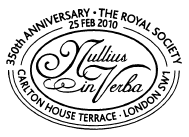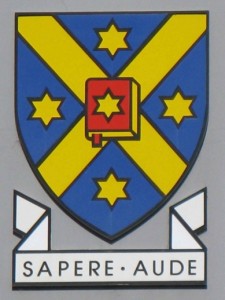Greg Dawes writes…
I was recently reading Peter Ackroyd’s short biography of Isaac Newton, when I was startled to come across the following sentence: “[The Royal Society] excluded all questions of politics and religion… Their motto became, Nullius in verba, ‘Nothing in words’, or nothing on authority.” As we shall see, “Nothing on authority” is a good rendering of the sense of the motto. But even with my modest knowledge of Latin I could see that Nullius in verba could not possibly be translated as “Nothing in words.” The latter phrase in Latin would be Nihil in verbis, but that was not the phrase chosen by the founders of the Royal Society.
Imagine my surprise, then, to find that “nothing in words” has become what Stephen Jay Gould once called the “canonical mistranslation” of this famous motto. Indeed while casually browsing the shelves of our public library I found another instance. In his popular book on the history of the Royal Society, John Gribbin offers the same combination of mistranslation with accurate paraphrase that appears in Ackroyd’s biography. “Nullius in Verba,” Gribbin writes, “translates literally as ‘nothing in words’ but should be taken as meaning ‘take no man’s word for it.” He’s right that it should be taken to mean “take no man’s word for it.” But he’s wrong to say that it “translates literally as ‘nothing in words.'”
A quick Web sea rch for the Latin phrase will reveal how common a mistranslation this is. You may not be surprised to find such a mistake in popular works. You may be even less surprised to find it on the Web, where (to borrow the words of Tacitus) “all things hideous and shameful from every part of the world find their home and become popular.” But Gould’s criticism was directed at no less a figure than the distinguished philosopher of science, Karl Popper.
rch for the Latin phrase will reveal how common a mistranslation this is. You may not be surprised to find such a mistake in popular works. You may be even less surprised to find it on the Web, where (to borrow the words of Tacitus) “all things hideous and shameful from every part of the world find their home and become popular.” But Gould’s criticism was directed at no less a figure than the distinguished philosopher of science, Karl Popper.
Popper and a fellow author had written to Science regarding the use of the names “progenote” and “protogenote.” The details of this particular “dispute about words” need not detain us. The only fact to note here is that Popper and his fellow author ended their letter by saying,
We all may at times be seduced by the tempting ease of introducing new words. But then, we should always respect the forbidding difficulties facing those who toil to establish new facts. As the founders of the Royal Society of London put it in 1663: Nullius in verba — there is nothing in words. It is facts we seek.
Popper may well be right that disputes about words are particularly fruitless. And it is surely true that scientists seek to know “the facts.” The problem is that the motto of the Royal Society does not make a contrast between facts and “mere words.” Nullius is the genitive singular of nemo, the Latin for “no one.” In verba is a puzzling phrase, for reasons I shall examine in a moment. But it is best understood here as “on the word of.” So the whole phrase can be literally translated as “on the word of no one,” or (as Ackroyd and Gribbin rightly suggest) “take nothing on authority.”
Following Gould’s letter, the issue was discussed by Clive Sutton in the British Journal for the History of Science. Sutton points out that the members of the Royal Society were opposed to the idea that verbal argumentation alone could lead to new knowledge. So the common mistranslation of their motto does, perhaps, capture one aspect of their thinking. But it remains a mistranslation, which fails to express what the motto was intended to convey.
The Latin motto has its origins in a work by the Roman poet Horace. In the first of his Epistles, Horace writes that he is setting aside mere literary concerns in order to turn to philosophy. “In case you ask me who’s my master, what roof protects me,” he writes, “I’m not bound to swear by anyone’s precepts [nullius addictus iurare in verba magistri], I’m carried, a guest, wherever the storm-wind blows me.” It is this passage that explains the slightly odd phrase in verba, which makes more sense as the indirect object of iurare than when taken out of context. But the fellows of the Royal Society could read Latin almost as easily as English. They could assume that their contemporaries would recognize the allusion and read the motto as it was intended.
But how was it intended? In its original context, Horace is presumably not saying that he will take no notice of what the various schools of philosophy teach. What he is saying is that he is not going to consider himself bound to any one of them. He is free to pick and choose whatever opinion he judges best. This lends some support to a thesis recently put forward by Thomas Ahnert, that the motto of the Royal Society reflected its “anti-sectarian aims … rather than its concern with the definition of reliable testimony”. On this view, the motto supports an eclectic attitude, as opposed to dogmatic adherence to a particular school of natural philosophy.
While this anti-sectarian interpretation cannot be excluded, there is evidence that the fellows were advocating reliance on first-hand evidence rather than second-hand reports. Sutton notes that one of the other phrases that was considered (and rejected) was a biblical one, namely omnia probate or “test all things,” originally from 1 Thessalonians 5. This, too, can be understood in the sense of opposing uncritical reliance on authorities. Sutton also cites a remark made by one fellow when the Society met for elections on St Andrew’s Day 1663. Responding to a suggestion that in England St George’s Day would have been more appropriate, the fellow said, “I had rather it [had] been on St. Thomas’s Day, for he would not beleeve till he had seen and putt his fingers into the holes; according to the motto, Nullius in Verba.'”
St Thomas, who is remembered for doubting the reports of Jesus’ resurrection and for believing only when faced with “experimental” evidence, was apparently the patron saint of the Royal Society.
There is, incidentally, a fascinating anticipation of these ideas in a remark made by William Gilbert, some sixty years before the founding of the Royal Society. In the preface to his De magnete, Gilbert asks why he should make his ideas public, given the lamentable state of contemporary natural philosophy. “Why,” he writes, “should I submit … this noble … philosophy to the judgement of men who have taken oath to follow the opinions of others [iuratis in alienorum sententias].” Here, too, there is a contrast between merely following authorities — the attitude Gilbert is condemning — and seeing for oneself.
By way of contrast, Gilbert goes on to describe his intended audience as “true philosophers … who seek knowledge not only in books but in things themselves [non in libris solum sed ex rebus ipsis].” One might be tempted to read this as a contrast between words and facts, of the kind employed by Popper. But what Gilbert is criticizing are those who seek knowledge in books alone (in libris solum). (He presumably wants people to read his book.) As Shapin and Schaffer note in Leviathan and the Air Pump, words had an important role to play in early modern experimental philosophy: they were the means by which experimental results could be conveyed to those who were not among the original witnesses.
 Finally, it might be interesting to note a certain similarity between the motto of the Royal Society and that of my own university, sapere aude. This phrase also came from one of Horace’s Epistles, where it has the sense of “dare to be wise.” (“Who’s started has half finished: dare to be wise! Begin!”) This is the translation favoured by the university authorities. But Horace’s phrase is also cited by Immanuel Kant in his essay Was ist Aufklärung? (“What is Enlightenment?”). In that context he translates it as “have the courage to use your own understanding” (Habe Mut, dich deines eigenen Verstandes zu bedienen). Here, too, a contrast is being made between thinking for yourself and relying on authority. As Kant writes,
Finally, it might be interesting to note a certain similarity between the motto of the Royal Society and that of my own university, sapere aude. This phrase also came from one of Horace’s Epistles, where it has the sense of “dare to be wise.” (“Who’s started has half finished: dare to be wise! Begin!”) This is the translation favoured by the university authorities. But Horace’s phrase is also cited by Immanuel Kant in his essay Was ist Aufklärung? (“What is Enlightenment?”). In that context he translates it as “have the courage to use your own understanding” (Habe Mut, dich deines eigenen Verstandes zu bedienen). Here, too, a contrast is being made between thinking for yourself and relying on authority. As Kant writes,
If I have a book to serve as my understanding, a pastor to serve as my conscience, a physician to determine my diet for me, and so on, I need not exert myself at all. I need not think, if only I can pay: others will readily undertake the irksome work for me.
But if I act in this way, I remain in a state of self-imposed tutelage, which is the very opposite of Enlightenment.
I have yet to convince the university authorities to replace their “Dare to be wise!” with “Have the courage to think for yourself!” This would, however, be closer to what Kant intended. It would also be consistent with the often mistranslated motto of the Royal Society.

